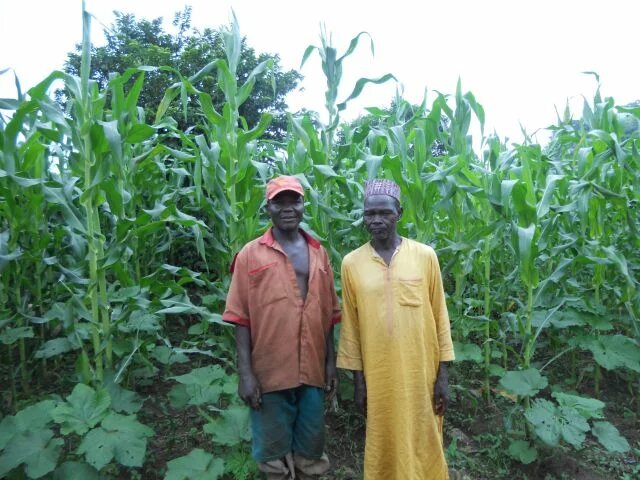
“In the past, rain used to come in March and to go by end of October. This year we started farming in June which is very late and we have to replant our maize several times because of inadequate rainfall. The weather has become very unpredictable, and that's the real problem", Mallam Ali said. Climate change is making farming more difficult for him, and he wonders how much worse things will become.
Environmental challenges ranging from drought and wind erosion in the north, gully erosion and severe floods across the country have become a yearly occurrence that Nigerians are forced to deal with at various seasons of the year. This year alone, severe cases of floods across many States have been reported leading to losses of farmlands. This confirms the predictions of the Inter-Governmental Panel on Climate Change (IPCC) that climate change will increase the frequency and intensity of natural disasters and extreme weather events, such as drought, floods and changes in rainfall patterns with expected reduction in agricultural productivity in already fragile areas, especially in sub-Saharan Africa.
The Heinrich Böll Stiftung together with Tubali Development Initiative from Kaduna embarked on a project that intends to assess the impact of climate change on agriculture in two different geographic zones of the country and to assist the concerned communities in developing methods for adaptation. A pre-study confirmed the gravity of climate change on agriculture, particularly on small-scale agriculture which has the potential of seriously impacting on food security and livelihoods not only of the rural people but of the country in general. It is likely to lead to a loss of stability in productivity and an overall decline in human development indices. Results from the study revealed that critical impact due to both climate and socio-economic structures may deepen the current poverty situation and increase political apathy in the northern region. The project is presently working in four remote rural communities (Chifatake and Aburon in Kaduna and Owelli Court and Ugwogo in Enugu States) which have hardly access to infrastructure such as main roads, electricity or storage facilities. The community members are mainly illiterate.
According to Hauwa Mustapha, Director of Tubali Development Initiative, “several years of decreasing yield in agricultural output and income have resulted in many farmers, especially the young ones, migrating from the rural farmlands to urban areas, often with deleterious consequences. Many social vices and unrests witnessed in recent times have been ascribed to these idle youths largely from the rural areas for which farming has lost its meaning and essence. In the cities they join the crowd of unemployed youth and often try to earn their living as commercial motorcycle riders or bus conductors but it is a well known fact that these activities can quickly lead into criminality. The predictions of IPCC coupled with above problems call for radical actions that will enhance the capacity of female and male farmers to achieve food security”, she said.
Mrs. Mustapha, reiterated that the support for these communities should not be the usual way where aid doesn’t get to the poor and most vulnerable. Most communities are marginalized, remote and receive limited services and support from Government. She insisted on a more radical approach. According to her, “where illiteracy prevails and access to information is a challenge, there is a need for innovative platforms for exchange to support knowledge generation and sharing”. Rather than providing strictly technical input to the farmers, the project is working on improving the networking and opinion sharing in order to build their capacity. It offers platforms of exchange with research institutions, agricultural extension services, NGOs and farm inputs suppliers. Everyone in the network is capitalizing on the connections and experiences of others to bring about a change. The multiple layers of actions through the network such as awareness raising among the farmers, trainings on sustainable farm methods, demonstration plots (adaptive research), provision of farm inputs, formation of farmers groups to access inputs from Government, regular visits by extension agents and experts researchers bring a better grasp of the solution to the problems of the farmers. In regular pre-planting meetings farmers in the communities are called together to dialogue with the experts before the commencement of planting. It will be followed by post harvest meetings to share the results. The network members monitor together the results and detect any weaknesses in the implementation. The training of trainers at the community level makes it possible for the vulnerable men and women to participate.
During a recent visit, farmers in the two communities in Kaduna State were full of joy. Mrs. Ruth Audu from Aburon community is optimistic that she is going to harvest much from her farm this year. Mr. Luka Wambe from the same community said that what makes him happy is the fact that he can pick his handset and call for help from either the extension agent or the researcher. He also knows where to go for farm inputs as a result of the network.
According to Mrs. Mustapha, “we are building farmers who know where to seek for solution to problems, access inputs and have access to loan facilities and markets, bringing about an interconnected system of information and support”. She hopes to transmit, as first hand information, the strategies of the project into the state adaptation plan since policy makers are involved in the project. While individual action will make a difference, a broad system change will be required to develop the kind of food production needed to ensure food security, and it is only the Government that has such capacity.